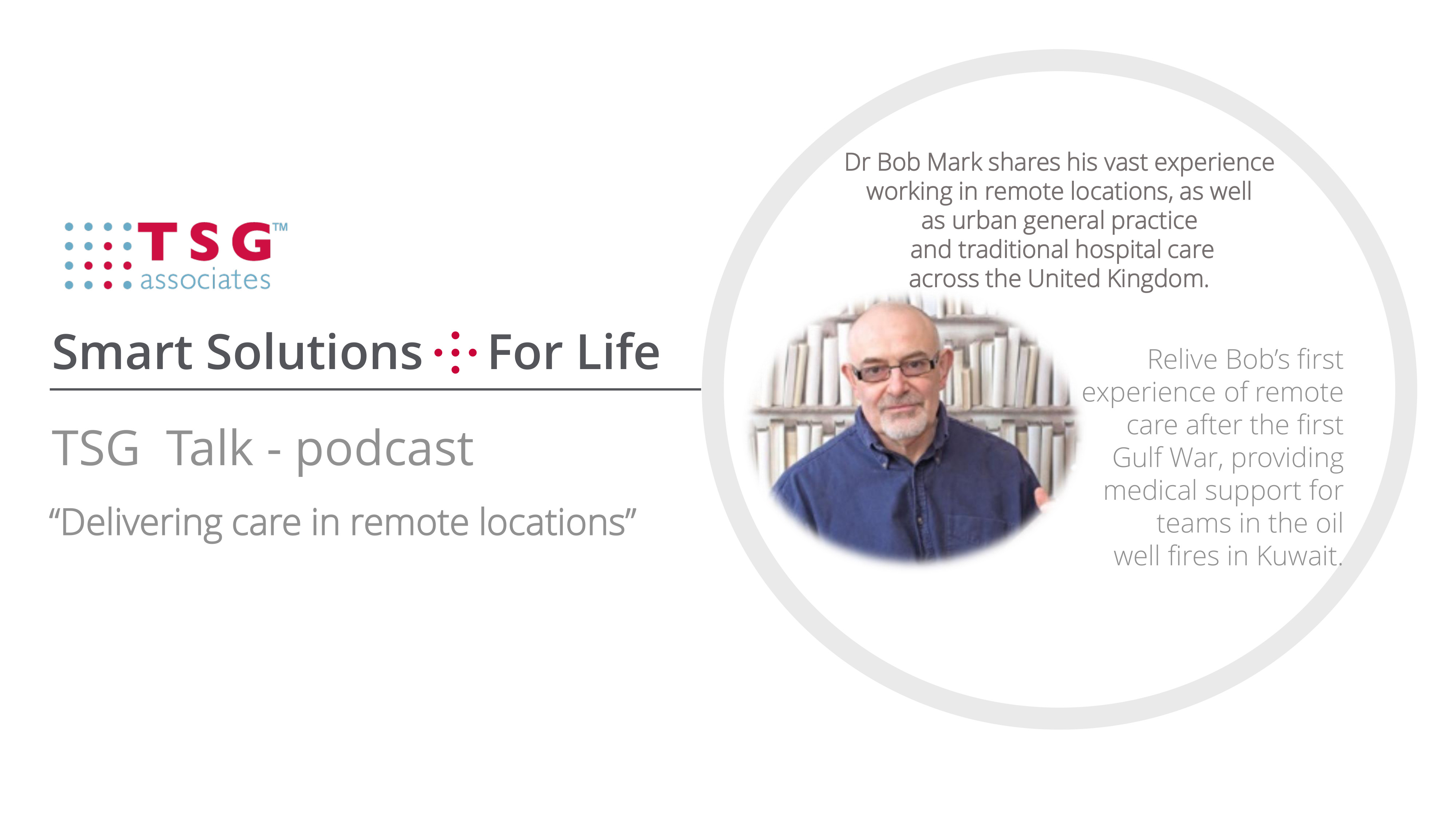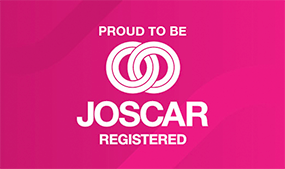
04/07/2022
TSG Talk - Delivering care in remote locations
Delivering optimum care will always be the primary objective to minimise suffering and maximise survival for all patients when they require assistance. This also applies to working remotely but there are several factors that need to be considered to ensure that the treatment is applied successfully.
In a recent episode of our podcast, TSG Talk, Senior Partner, Colin Smart discussed this topic in great depth with Dr Bob Mark, who has vast experience working in remote locations.
The importance of effective communication
Being able to deliver care in a remote setting can pose challenges, it’s often a role that isn’t looked at as closely as it should be. Despite advances in telemedicine, effective communication is one of the biggest challenges that comes with remote care. As Dr Bob Mark explains below, listening is also important to be able to assess the scenario and produce the best solution quickly.
“You've got to be somebody who's put work into understanding what's going on - or just has the imagination to work out what's going on. If you come up with ideas, you've got to be able to listen to the medic. If you produce a solution that isn't going to work for whatever reason, you're not aware of it until they point it out to you. The medics have got to be able to communicate in an orderly structured fashion, which is a really difficult skill to learn. It's difficult to present a patient without bouncing around all over the place. That was one of the things I always found difficult.”
Recurring issues when delivering remote care
A wide range of skills are essential for delivering remote care, as you can be treating patients for a variety of injuries/ailments such as minor illness, injuries, mental health and occupational health. Time isn’t on your side in these situations. It’s important to balance your key skills with the emergency skills required to be able to minimise suffering for the patient.
“In most remote areas, it's going to be minor illness, minor injuries, mental health problems, occupational health. So, you've got to have a very broad range of skills, but you've got to keep up your emergency skills, because obviously that's time limited. You can't learn that on the job, you’ve got to learn the other things on the job. Prevention of illness and injury is of so much importance in remote areas, so that you don't end up with the difficulties of major illness or injury.”
Dealing with the situation at hand starts before care is administered. Someone will be assigned the role of tending to the patient, but there will be others on hand to ensure that policies are met and health and safety is followed on site.
“Having to deal with that starts from back in the world, with staff selection fitness to work policies, and health and safety on site. Incredibly important, crucial, but possibly not very sexy. But nevertheless, it's incredibly important and a whole different mindset from MCIs and trauma care.”
The impact of multiple casualties in remote areas
Multiple casualties in remote areas pose greater challenges than in a typical setting, they can potentially outnumber your resources at an early stage. Therefore, it’s vital to have a detailed plan of action that involves the safe care and evacuation of all patients without being overwhelmed by the numbers that you could potentially encounter.
“In a remote area, you have almost by definition, a very small medical resource. In terms of people and equipment, you don't need many casualties before your system is overloaded. A multiple casualty incident in the remote area isn't necessarily the sort of 10s or 20s - you might think about in a conventional environment. There you've got lots of ambulances, lots of hospitals, you can spread the load, you've got lots of staff. It might well just be you and your first aid team. You can be rapidly overwhelmed by a much smaller number of serious casualties. You've got to plan for that.”
Everyone in your medical team has an important part to play in ensuring that the best solution can be provided to those in need of care. This will mean coming up with ideas for what course of action to take and justifying why this is the best course of action to your colleagues.
“The other thing you've got to do once you've got that idea on board for yourself. You've got to sell that idea to the people that you're working with in the team, - the non-medical parts of that spider's web you referred to, particularly the people who have to approve the plans and who have to spend a little bit of money that's required to make it work.”
Tips for remote deployment
Although there are many factors that go into providing care, especially in remote locations. You should always have at the forefront of your mind that the patient must always come first.
“First and obvious I suppose is, don't lose sight of the patient always comes first. There's so much going on and being dragged in so many different directions. But the patient comes first. That's your principal priority.”
Understanding your location and how to get from point a to point b is crucial so that you can quickly be on hand to provide assistance nearby as well as always communicating in order to do your role to the best standards for the benefit of the patient.
“Second thing I would suggest would be don't be a stranger. You need to know the area that you're working in. You need to know where things are. You need to know how to get around. How to get to the locations where your help might be required. You need to know the people that you’re working with and what jobs those people actually do and how those jobs can impact on their health.”
What is your essential medical equipment?
Dr Mark then explained why a communication device was his equipment of choice.
“It’s easy. That’s a magic telecommunications device that is going to be 100% reliable at all times and in all locations, allowing me to speak to anyone I want to instantly.”
Find out more
Click here to listen to the full TSG Talk episode featuring Dr Bob Mark, to find out more about life-saving solutions, please call TSG Associates on 01422 557841 or email us at info@tsgassociates.
In a recent episode of our podcast, TSG Talk, senior partner Colin Smart discussed this topic in great depth with Dr Bob Mark, who has vast experience working in remote locations.
The importance of effective communication
Being able to deliver care in a remote setting can pose challenges. Despite advances in telemedicine, effective communication is one of the biggest challenges that comes with remote care. As Dr Bob Mark explains below;
The medics have got to be able to communicate in an orderly structured fashion, which can be a really difficult skill to learn. It's often difficult to present a patient without bouncing around all over the place. That was one of the things I always found difficult.”
The Doctor receiving the information must understand the parameters that that Medic is working within and ensure that any proposed actions are compatible to where they are.
Recurring issues when delivering remote care;
A wide range of skills is essential for delivering remote care, Medic’s can be required to treat patients for a variety of injuries/ailments such as minor illnesses, injuries, mental health, and occupational health. Your emergency response skills will also have to be kept up to date, often within a scenario where you are not using them on a regular basis.
“In most remote areas, it's going to be minor illness, minor injuries, mental health problems, occupational health. So, you've got to have a very broad range of skills, but you've got to keep up your emergency skills because obviously that's an acutely time critical lifesaving area.
Prevention of illness and injury is of so much importance in remote areas so that you don't end up with the difficulties of major illness or injury caused by lack of preparation and awareness of the environment you are operating in.
The impact of multiple casualties in remote areas
Multiple casualties in remote areas pose greater challenges than in a typical setting, they can potentially outnumber your resources at an early stage. Therefore, it’s vital to have a detailed plan of action that involves the safe care and evacuation of all patients.
“In a remote area, you have almost by definition, a very small medical resource. In terms of people and equipment, you don't need many casualties before your system is overloaded. A multiple casualty incident in the remote area isn't necessarily the sort of 10s or 20s you might think about in a conventional environment. There you've got lots of ambulances, lots of hospitals, you can spread the load, you've got lots of staff. It might well just be you and your first aid team. You can be rapidly overwhelmed by a much smaller number of serious casualties. You've got to plan for that.”
Everyone in your medical team has an important part to play in ensuring that the best solution can be provided to those in need of care. This will mean coming up with ideas for what course of action to take and justifying why this is effective.
Tips for remote deployment
Although there are many factors that go into providing care, especially in remote locations, you should always have at the forefront of your mind that the patient must always come first.
“First and obvious I suppose is, don't lose sight of the patient always comes first. There's so much going on and being dragged in so many different directions. But the patient comes first. That's your principal priority.”
Understanding your location and how to get from point A to point B is crucial so that you can quickly be on hand to provide assistance nearby, as well as always communicating in order to do your role to the best standards for the benefit of the patient.
“Second thing I would suggest would be don't be a stranger. You need to know the area that you're working in. You need to know where things are. You need to know how to get around. How to get to the locations where your help might be required. You need to know the people that you’re working with and what jobs those people actually do and how those jobs can impact on their health.”
Find out more
Click here to listen to the full TSG Talk episode with Dr Bob Mark, and to find out more about our life-saving solutions then please contact TSG Associates at 01422 557841 or email us at info@tsgassociates.co.uk.




%202.png)
.png)







